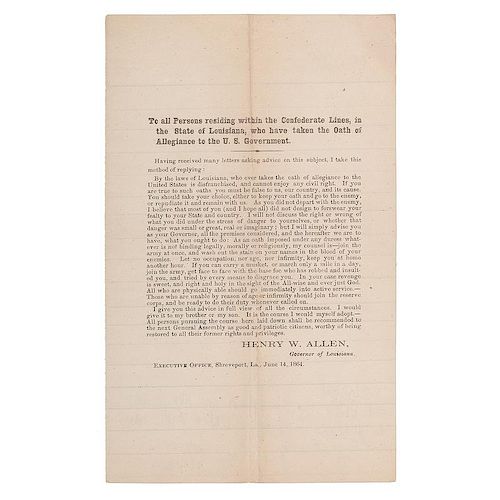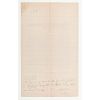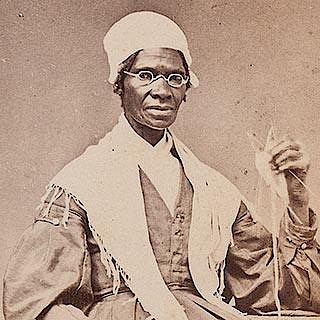CSA Proclamation Issued by Louisiana Governor Henry W. Allen Calling for All Persons to Disavow Loyalty to the Union, 1864
About Seller
6270 Este Ave.
Cincinnati , OH 45232
United States
With offices in Cincinnati, Cleveland and Denver, Cowan’s holds over 40 auctions each year, with annual sales exceeding $16M. We reach buyers around the globe, and take pride in our reputation for integrity, customer service and great results. A full-service house, Cowan’s Auctions specializes in Am...Read more
Two ways to bid:
- Leave a max absentee bid and the platform will bid on your behalf up to your maximum bid during the live auction.
- Bid live during the auction and your bids will be submitted real-time to the auctioneer.
Bid Increments
| Price | Bid Increment |
|---|---|
| $0 | $25 |
| $500 | $50 |
| $1,000 | $100 |
| $2,000 | $250 |
| $5,000 | $500 |
| $10,000 | $1,000 |
| $20,000 | $2,500 |
| $50,000 | $5,000 |
| $100,000 | $10,000 |
About Auction
Jun 9, 2017 - Jun 10, 2017
Cowan's Auctions dawnie@cowans.com
- Lot Description
Very rare imprint, 5 x 8 in. Executive Office, Shreveport, LA, June 14, 1864. To all Persons residing within the Confederate Lines, in the State of Louisiana, who have taken the Oath of Allegiance to the US Government.
Allen goes on: Having received many letters asking advice on this subject, I take this method of replying.
By the laws of Louisiana, who ever takes the oath of allegiance to the United States is disfranchised, and cannot enjoy any civil right. If you are true to such oaths you must be false to us, our country, and its cause. You should take your choice, either to keep your oath and go to the enemy, or repudiate it and remain with us. As you did not depart with the enemy, I believe that most of you (and I hope all) did not design to forswear your fealty to your State and country.... As an oath imposed under any duress whatever is not binding legally, morally or religiously, my counsel is -- join the army at once, and wash out the stain on your names in the blood of your enemies.... If you can carry a musket,... get face to face with the base foe who has robbed and insulted you, and tried by every means to disgrace you...
I give you this advice in full view of all the circumstances. I would give it to my brother or my son....All persons pursuing the course here laid down shall be recommended to the next General Assembly as good and patriotic citizens, worthy of being restored to all their former rights and privileges.
From the beginning of the war, Lincoln realized that control of the Mississippi River would be key to winning the war. All manner of goods, munitions and troops moved along the watery corridor. New Orleans was captured by the end of April 1862, with little fighting in the city itself (thus sparing much of the historic architecture we see today). The city was governed by General Benjamin Butler, who acquired the epithet "The Beast" for his actions in the city, especially General Order #28 (the "Woman Order," in which he stated that women who harassed Union troops were no better than prostitutes, and would be treated as such). Butler was replaced in December by Nathaniel Banks, a bit more acceptable to some, but by that time, much of the populace was completely offended and hostile. (Butler did, however, organize a cleanup of the city, and it became one of the healthiest 19th century cities in North America. He also focused on work for the poor and other social projects.)
Union forces continued to fight for the River, moving from both south and north. By 1863, they controlled all but a 150-mile strip between Vicksburg, MS and Port Hudson, LA. Once Vicksburg fell in July, the river was Union territory. As the Union troops took more territory (mostly along the rivers), Louisiana moved her capital to Shreveport (from whence this was issued).
Somewhat surprisingly the state was almost undefended other than the few ports along the rivers. Governor Moore called for the formation of partisan ranger units to fight Union troops. In this proclamation, Governor Allen essentially repeats this call, asking men to join armed units, depending on their age and physical abilities.
In his address to Congress December 8, 1863, Lincoln issued his Proclamation of Amnesty and Reconstruction, outlining his plan for reunification of the United States. Louisiana became something of a laboratory. The plan included a full pardon and restoration of property for all "rebels" except the highest ranking Confederate officials. This would have been very appealing to "average" citizens, who would not lose all they owned (theoretically) because of the war. It also allowed for a new state government to be formed when an oath of allegiance was taken by 10 percent of those who voted in 1860 (the "10 Percent Plan"). It lastly encouraged newly "reconstructed" states to plan on how to deal with freed slaves. Overall the plan was easy and charitable for most Southerners ("With malice toward none, with charity for all..." this theme was repeated in Lincoln's second inaugural address just months later.)
By early 1864 Louisiana approved a new Union constitution and held a Union election on February 22, selecting Michael Hahn as Governor. The Confederate supporters had elected Henry Allen in later 1863, and he also took office in 1864. It was certainly this division of the state that prompted Allen to issue his proclamation offered here.
In spite of its Union affiliation, General Smith's Army was the last Confederate army to surrender on May 26, 1865. (Stand Watie surrendered on June 23, but his unit of Indians was not a full army.) After Smith's surrender, both Governors Moore and Allen fled to Mexico, fearing reprisals. Moore eventually returned, but Allen died in Mexico.
Provenance: Property of N. Flayderman & Co.Folds, with some minor scuffing and toning on the central vertical fold. Overall very good condition.Condition
- Shipping Info
-
SHIPPING. At the request of the buyer, Cowan's will authorize the shipment of purchased items. Shipments usually occur within two weeks after payment has been received. Shipment is generally made via UPS Ground service. Unless buyer gives special instructions, the shipping method shall be at the sole discretion of Cowan's Auctions, Inc.. Cowan's is in no way responsible for the acts or omissions of independent handlers, packers or shippers of purchased items or for any loss, damage or delay from the packing or shipping of any property.
-
- Buyer's Premium



 EUR
EUR CAD
CAD AUD
AUD GBP
GBP MXN
MXN HKD
HKD CNY
CNY MYR
MYR SEK
SEK SGD
SGD CHF
CHF THB
THB












